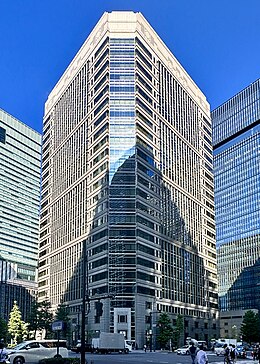Mizuho Securities
 | |
 Headquarters in Ōtemachi, Chiyoda, Tokyo | |
| Mizuho Securities | |
Native name | みずほ証券株式会社 |
Romanized name | Mizuho Shōken Kabushiki-gaisha |
| Industry | Financial services |
| Headquarters | Ōtemachi, Tokyo , |
| Services | Securities brokerage Investment banking Securities research |
Number of employees | 6,994 (March 2016) |
| Parent | Mizuho Financial Group |
| Website | mizuhogroup.com/securities |
Mizuho Securities Co., Ltd. (みずほ証券株式会社, Mizuho Shōken Kabushiki-gaisha) is a Japanese investment banking and securities firm. It is a wholly owned subsidiary of Mizuho Financial Group.
History
[edit]The current Mizuho Securities is established by a merger between Shinko Securities and the former Mizuho Securities. The former Shinko Securities (a former equity-method affiliate of Mizuho Financial Group) and the former Mizuho Securities (a former consolidated subsidiary of Mizuho Financial Group) merged on 7 May 2009. The effective date of the merger was postponed a couple of times due to the financial crisis.[1] The surviving entity was the former Shinko Securities, which changed its name to Mizuho Securities upon the merger. After the merger, Mizuho Financial Group holds 59.51% equity ownership of the new Mizuho Securities.[2] In 2004, the Polaris Capital Group was divested, focusing on private equity investment.[3] Mizuho Securities is involved in bond and stock trading, debt and equity financing, and advisory services for structured finance; its clients include financial institutions, public corporations, and institutional investors or firms.[4] It also issues buy and sell ratings for publicly traded stocks.[5] During the early 2000s, it was considered to be one of the "big four" firms that controlled a large portion of Japanese trading.[6] In December 2005, an employee at Mizuho Securities placed an erroneous sell order of J-COM Co., Ltd. shares on the Tokyo Stock Exchange,[7] resulting in a loss of approximately ¥40.7 billion.[8]
Mizuho Securities then brought a case for its damages against the Tokyo Stock Exchange (TSE) as they could not cancel the order due to a fault in the TSE's computer system.[9] The president of TSE resigned in 2005.[10] Mizuho was awarded approximately ¥10.7 billion.[7] Mizuho Securities operates several subsidiaries, including Mizuho Securities USA, where the CEO is Gerald Rizzieri.[11][12]
References
[edit]- ^ "Form 6-K".
- ^ "Form 20-F Mizuho Financial Group, Inc". Financial Group, Inc. 2009-08-19. p. 42. Archived from the original on 2011-07-14. Retrieved 2010-04-14.
- ^ Kimura, Yuji (October 2013). Polaris Capitalism. ISBN 9781304483089.
- ^ O'Connor, A. (November 2005). Trade, Investment and Competition in International Banking. ISBN 9780230512375.
- ^ "salesforce.com (CRM) PT Raised to $110 at Mizuho Securities".
- ^ Park, Yung Chul; Patrick, Hugh (2013-11-26). How Finance is Shaping the Economies of China, Japan, and Korea. ISBN 9780231165266.
- ^ a b Mizuho Securities v. Tokyo Stock Exchange (Tokyo District Court, 4 December 2009)
- ^ "News release re the first instance judgment rendered in the lawsuit for damages against the Tokyo Stock Exchange, Inc" (PDF). Mizuho Securities. 2009-12-04. p. 1. Retrieved 2010-04-16.
- ^ Mizuho Securities v. Tokyo Stock Exchange (Tokyo District Court, December 4, 2009)
- ^ "'Fat finger' trade costs Tokyo shares boss his job". The Independent. 2005-12-21. Archived from the original on 2022-05-15. Retrieved 2018-06-22.
- ^ "Mizu-Who? The Japanese Bank That Wants to be the New Face of Wall Street". Forbes.
- ^ "Mizuho Securities Promotes Gerald Rizzieri as its President and CEO | Finance Magnates". 9 March 2016.
